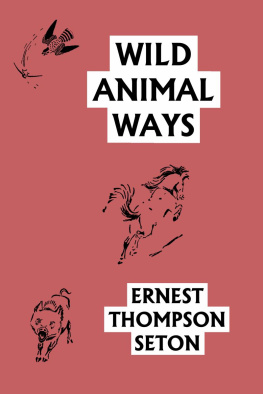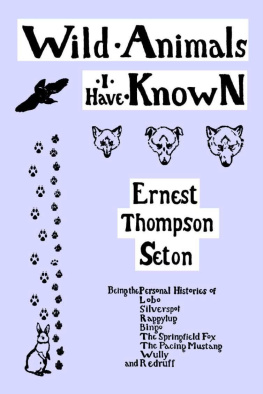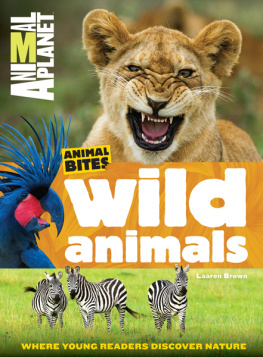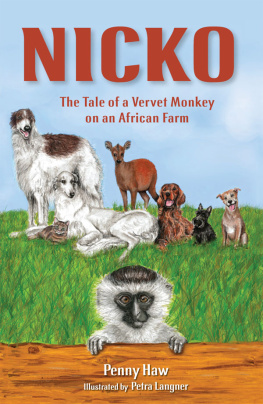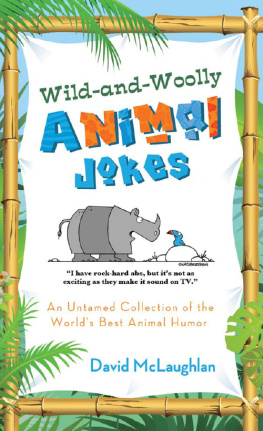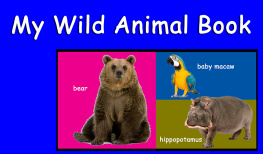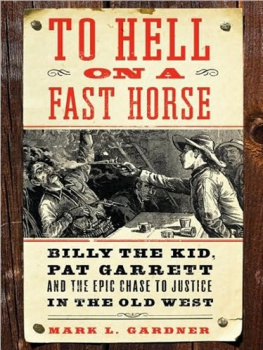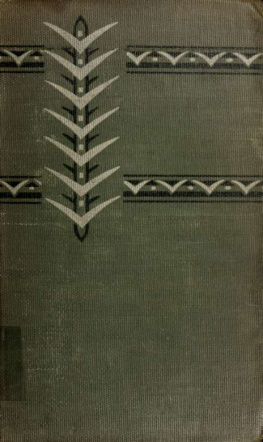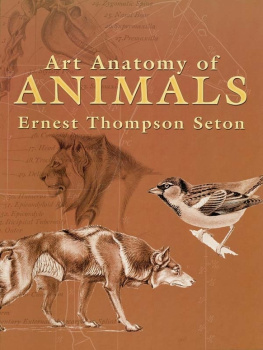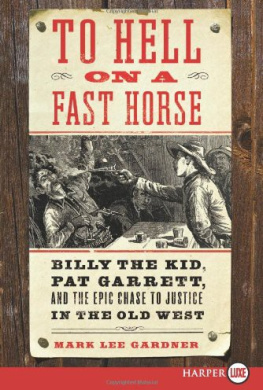Ernest Thompson Seton - Wild Animal Ways
Here you can read online Ernest Thompson Seton - Wild Animal Ways full text of the book (entire story) in english for free. Download pdf and epub, get meaning, cover and reviews about this ebook. year: 2009, publisher: Yesterdays Classics, genre: Science. Description of the work, (preface) as well as reviews are available. Best literature library LitArk.com created for fans of good reading and offers a wide selection of genres:
Romance novel
Science fiction
Adventure
Detective
Science
History
Home and family
Prose
Art
Politics
Computer
Non-fiction
Religion
Business
Children
Humor
Choose a favorite category and find really read worthwhile books. Enjoy immersion in the world of imagination, feel the emotions of the characters or learn something new for yourself, make an fascinating discovery.
- Book:Wild Animal Ways
- Author:
- Publisher:Yesterdays Classics
- Genre:
- Year:2009
- Rating:4 / 5
- Favourites:Add to favourites
- Your mark:
- 80
- 1
- 2
- 3
- 4
- 5
Wild Animal Ways: summary, description and annotation
We offer to read an annotation, description, summary or preface (depends on what the author of the book "Wild Animal Ways" wrote himself). If you haven't found the necessary information about the book — write in the comments, we will try to find it.
Wild Animal Ways — read online for free the complete book (whole text) full work
Below is the text of the book, divided by pages. System saving the place of the last page read, allows you to conveniently read the book "Wild Animal Ways" online for free, without having to search again every time where you left off. Put a bookmark, and you can go to the page where you finished reading at any time.
Font size:
Interval:
Bookmark:
All rights reserved. No part of this book may be reproduced or retransmitted in any form or by any means without the written permission of the publisher.
This edition, first published in 2010 by Yesterday's Classics, an imprint of Yesterday's Classics, LLC, is an unabridged republication of the work originally published by Doubleday, Page & Company in 1919. This title is available in a print edition (ISBN 978-1-59915-335-3).
Yesterday's Classics republishes classic books for children from the golden age of children's literature, the era from 1880 to 1920. Many of our titles are offered in high-quality paperback editions, with text cast in modern easy-to-read type for today's readers. The illustrations from the original volumes are included except in those few cases where the quality of the original images is too low to make their reproduction feasible. Unless specified otherwise, color illustrations in the original volumes are rendered in black and white in our print editions.
When I look at the names of the animals whose stories are given here, I feel much as an artist might in looking at sundry portraits of his friends and ideals painted by himself.
Some of these I personally knew. Some are composites, and are merely natural history in story form. Way-atcha, Atalapha, and Foam are of the latter kind.
Foam is an effort to show how the wild things instinctively treat themselves in sickness. They have their herbs, their purges, their sudorifics, their hot and cold baths, their mud baths, their fastings, their water sluicings, their massage, their rest cure, and their sun treatment.
The final scene when the Razor-back utterly defeated the Bear was witnessed and related to me long ago by a Michigan lumberman, whose name I cannot recall. The minor incidents are largely from personal observation of wild hogs in various parts of America. I am in hopes that some will see the despised Razor-back in a more friendly light when they realize the strong and wise little soul that lurks behind those blinking eyes.
The Wild Geese is a simple narrative of well-known facts, facts that I observed among the Honkers in my own home park.
Jinney, the bad monkey, I never saw, but I have told her story as it was given to me by my old friend Louis Ohnimus, at one time Director of the Woodward Zoological Gardens in San Francisco, California.
Billy and Coaly-Bay are in the main true, and a recent letter from the West gives me new light on the history of the wild horse. The story had just appeared in Collier's Magazine , where the writer saw it. The letter runs as follows:
"January 26, 1916. I, too, knew Coaly-Bay, the glorious creature. He began his struggles in the Bitterroot Mountains of Idaho, left through the Salmon River country straggling tales of his fierce resentment under the yoke, and escaped triumphantly at last to the plains in the south.
"I was sixteen then and it is six years ago.
"Something, however, you failed to record. It is this: that before he escaped from the world of spur and lash, the world of compulsion, the world that denies to a horse an end in himself, he came to love one personme, the woman who petted instead of saddled him, who gave him sugar instead of spurring him, who gloried in him because he dared assert that he belonged to himself. For I, too, was an outlaw.
"When I wandered joyfully through the evergreen labyrinths of the Florence Basin, sniffing like a hare or fox the damp spring smell of the earth, going far down the narrow, rock-walled canyons for the first wild orchids, Coaly-Bay came, too. I did not ride or drive him. He trotted beside me as might a dog. We were pals, equals, fellow rebels. I went with him where he could find the first young meadow grass, and he went with me where grew the first wild strawberries. As together we glimpsed, far below, the green ribbon that was the Salmon River, or saw, far off, the snow attempting to cover the sinister blackness of the Buffalo Hump, we laughed at the stupidity of the world of man, who sought to drive things, to compel things, to master things, breeding hate and viciousness thereby; the stupidity of the world of men who never dreamed of the marvellous power of love!
"But they came between us, these men; and when Coaly-Bay broke the leg of one of them, I laughed. That day when they were going to crush his spirit with a bullet, I hated them! And when he escaped down those endless labyrinths, which we had threaded together so often, how I gloated! But later I wept, for he had left me to be an outlaw alone.
"Yes, always I shall love the memory of Coaly-Bay. He was a symbol of the eternal spirit of Revolt against the Spur of Oppression. My desire is to be as true to that spirit as he was, to fight the lash and spur, to bleed or starve rather than submit."
I gladly quote this letter because it interprets some others of my friends as well as Coaly-Bay. New York,
| February 27, 1916. |
M ANY years ago in the Bitterroot mountains of Idaho there was a beautiful little foal. His coat was bright bay; his legs, mane, and tail were glossy blackcoal black and bright bayso they named him Coaly-bay.
"Coaly-bay" sounds like "Kolibey," which is an Arab title of nobility, and those who saw the handsome colt, and did not know how he came by the name, thought he must be of Arab blood. No doubt he was, in a faraway sense; just as all our best horses have Arab blood, and once in a while it seems to come out strong and show in every part of the creature, in his frame, his power, and his wild, free roving spirit.
Coaly-bay loved to race like the wind, he gloried in his speed, his tireless legs, and when careering with the herd of colts they met a fence or ditch, it was as natural to Coaly-bay to overleap it, as it was for the others to sheer off.
So he grew up strong of limb, restless of spirit, and rebellious at any thought of restraint. Even the kindly curb of the hay-yard or the stable was unwelcome, and he soon showed that he would rather stand out all night in a driving storm than be locked in a comfortable stall where he had no vestige of the liberty he loved so well.
He became very clever at dodging the horse wrangler whose job it was to bring the horseherd to the corral. The very sight of that man set Coaly-bay agoing. He became what is known as a "Quit-the-bunch"that that is a horse of such independent mind that he will go his own way the moment he does not like the way of the herd.

So each month the colt became more set on living free, and more cunning in the means he took to win his way. Far down in his soul, too, there must have been a streak of cruelty, for he stuck at nothing and spared no one that seemed to stand between him and his one desire.
When he was three years of age, just in the perfection of his young strength and beauty, his real troubles began, for now his owner undertook to break him to ride. He was as tricky and vicious as he was handsome, and the first day's experience was a terrible battle between the horse-trainer and the beautiful colt.
But the man was skilful. He knew how to apply his power, and all the wild plunging, bucking, rearing, and rolling of the wild one had no desirable result. With all his strength the horse was hopelessly helpless in the hands of the skilful horseman, and Coaly-bay was so far mastered at length that a good rider could use him. But each time the saddle went on, he made a new fight. After a few months of this the colt seemed to realize that it was useless to resist, it simply won for him lashings and spurrings, so he pretended to reform. For a week he was ridden each day and not once did he buck, but on the last day he came home lame.
Font size:
Interval:
Bookmark:
Similar books «Wild Animal Ways»
Look at similar books to Wild Animal Ways. We have selected literature similar in name and meaning in the hope of providing readers with more options to find new, interesting, not yet read works.
Discussion, reviews of the book Wild Animal Ways and just readers' own opinions. Leave your comments, write what you think about the work, its meaning or the main characters. Specify what exactly you liked and what you didn't like, and why you think so.

